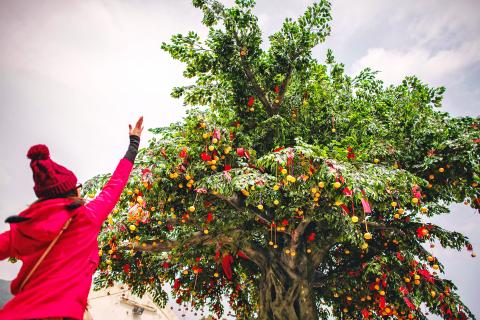Carnivals and fireworks are Hong Kong’s trademark Lunar New Year celebrations — but tens of thousands of people also travel to a remote village to hurl oranges at a tree in hopes of making their wishes come true.
In a tradition stretching back more than a century, visitors to the “wishing tree” in Lam Tsuen — a village near the territory’s northern border — come from all over the territory and China to take part.
Lines of hopefuls write their wishes on red pieces of paper, attach them to oranges and throw the fruit at a tree in the village square. If the orange lodges on a branch, the wish will come true — or so the belief goes.

Photo: AFP
A banyan tree used for the tradition was replaced with a plastic replica after an accident in 2005, which saw a branch loaded with oranges snap off and injure an elderly man and a child. Plastic fruit is now also used.
However, that has not put off the crowds of annual visitors who started flocking to the tree on Thursday and will do so for more than a week over the holiday period.
“I wished happiness and good health for my family. Everybody is looking for a good sign,” Frank Fung, a 26-year old computer engineer, said after he landed his wish on a tree branch with one throw.
“I wished to have a child last year and now I am pregnant,” said Xiao Xiaomei, in her 30s.
Children, couples and the elderly, with many wearing bright red for good luck, threw their wishes, which cost HK$25 (US$3.20).
“It’s my first time here, I think it’s wonderful, I think it’s traditional — it’s real Hong Kong,” said Helen Friel, 27, a teacher from Ireland who has worked in Hong Kong for three years. “I wished for good health and wealth for my family.”
The tradition was started by Chinese fishermen who would write their wishes onto paper and throw them onto trees at the Lunar New Year, said Luke Lam, organizer of the festival, who was born in Lam Tsuen and has lived there most of his life.
The fishermen would travel from the territory’s southern ports and visit temples to make offerings to protective deities and throw up wishes en route to the final temple in Lam Tsuen, Lam said.
“They would also leave red packets [紅包, hong bao] attached to their wishes — when I was little I opened the red pockets after they left,” Lam said of the fishermen’s offerings.
Originally attached to stones, the wishes were fixed to real oranges in the mid-1990s before the move to plastic fruit. In the past, wishing trees had also burned down as joss sticks were used to make offerings as well.
The banyan that was damaged a decade ago is still there — supported by beams.
Over the years, the public adopted the fishermen’s tradition of throwing wishes, spurred on by television soap operas which made it popular in the 1990s, said Lam, adding that the village sees more than 10,000 people a day during the Lunar New Year holidays.
“It’s very universal to make a wish,” Lam said.

Drug lord Jose Adolfo Macias Villamar, alias “Fito,” was Ecuador’s most-wanted fugitive before his arrest on Wednesday, more than a year after he escaped prison from where he commanded the country’s leading criminal gang. The former taxi driver turned crime boss became the prime target of law enforcement early last year after escaping from a prison in the southwestern port of Guayaquil. Ecuadoran President Daniel Noboa’s government released “wanted” posters with images of his face and offered US$1 million for information leading to his capture. In a country plagued by crime, members of Fito’s gang, Los Choneros, have responded with violence, using car

CYBERCRIME, TRAFFICKING: A ‘pattern of state failures’ allowed the billion-dollar industry to flourish, including failures to investigate human rights abuses, it said Human rights group Amnesty International yesterday accused Cambodia’s government of “deliberately ignoring” abuses by cybercrime gangs that have trafficked people from across the world, including children, into slavery at brutal scam compounds. The London-based group said in a report that it had identified 53 scam centers and dozens more suspected sites across the country, including in the Southeast Asian nation’s capital, Phnom Penh. The prison-like compounds were ringed by high fences with razor wire, guarded by armed men and staffed by trafficking victims forced to defraud people across the globe, with those inside subjected to punishments including shocks from electric batons, confinement

The team behind the long-awaited Vera Rubin Observatory in Chile yesterday published their first images, revealing breathtaking views of star-forming regions as well as distant galaxies. More than two decades in the making, the giant US-funded telescope sits perched at the summit of Cerro Pachon in central Chile, where dark skies and dry air provide ideal conditions for observing the cosmos. One of the debut images is a composite of 678 exposures taken over just seven hours, capturing the Trifid Nebula and the Lagoon Nebula — both several thousand light-years from Earth — glowing in vivid pinks against orange-red backdrops. The new image

Canada and the EU on Monday signed a defense and security pact as the transatlantic partners seek to better confront Russia, with worries over Washington’s reliability under US President Donald Trump. The deal was announced after a summit in Brussels between Canadian Prime Minister Mark Carney and European Commission President Ursula von der Leyen and European Council President Antonio Costa. “While NATO remains the cornerstone of our collective defense, this partnership will allow us to strengthen our preparedness ... to invest more and to invest smarter,” Costa told a news conference. “It opens new opportunities for companies on both sides of the